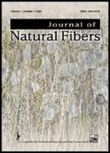
Journal of Natural Fibers
Scope & Guideline
Exploring the Sustainable Future of Natural Fibers
Introduction
Aims and Scopes
- Natural Fiber Characterization:
Research on the physical, chemical, and mechanical properties of various natural fibers, including their structures and characteristics, to understand their potential applications. - Fiber Modification Techniques:
Studies focusing on chemical, physical, and enzymatic treatments to enhance the properties of natural fibers, including their strength, durability, and functional capabilities. - Sustainable Applications:
Exploration of natural fibers in eco-friendly products, including textiles, composites, and biodegradable materials, highlighting their environmental benefits. - Innovative Fiber Composites:
Development and analysis of composite materials that incorporate natural fibers, addressing their mechanical and thermal properties for industrial applications. - Natural Dyeing and Finishing Processes:
Research into the use of natural dyes and eco-friendly finishing methods for textile applications, aiming to reduce environmental impact while preserving aesthetic qualities. - Technological Integration:
Investigations into the integration of natural fibers with modern technologies, such as nanotechnology and advanced manufacturing techniques, to enhance performance and applications.
Trending and Emerging
- Biocomposites and Sustainable Materials:
An increasing body of work is dedicated to the development of biocomposites that utilize natural fibers for enhanced sustainability in construction, packaging, and automotive applications. - Functionalization of Natural Fibers:
Research is trending towards the functionalization of natural fibers with additives and treatments that impart specific properties, such as antibacterial or UV protection, broadening their application scope. - Natural Fiber in Smart Textiles:
There is a growing interest in integrating natural fibers into smart textiles, focusing on their potential for use in wearable technology and health monitoring applications. - Environmental Impact Studies:
Research examining the environmental impact of natural fibers, including lifecycle assessments and sustainability analyses, is gaining prominence as the industry seeks greener solutions. - Nanotechnology in Fiber Development:
The application of nanotechnology to enhance the properties of natural fibers, such as strength, durability, and functionality, is emerging as a significant area of research.
Declining or Waning
- Traditional Fiber Applications:
There appears to be a decreasing emphasis on traditional uses of natural fibers, such as in basic textiles, as more innovative and functional applications gain traction. - Chemical Fiber Treatments:
Research on the use of harsh chemical treatments for fiber enhancement is declining, possibly due to the increasing preference for environmentally friendly methods. - Conventional Natural Dyeing Methods:
The exploration of conventional dyeing methods is waning in favor of sustainable and innovative dyeing techniques that reduce environmental impact. - Basic Mechanical Testing:
There is a noticeable shift away from basic mechanical property testing of fibers towards more complex analyses that consider multi-fiber interactions and composite behaviors. - Static Applications:
Research focusing solely on static applications of natural fibers, such as in non-load-bearing textiles, is diminishing as the focus shifts towards dynamic and functional applications.
Similar Journals
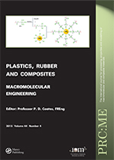
PLASTICS RUBBER AND COMPOSITES
Connecting Researchers and Industry in Material SciencePLASTICS RUBBER AND COMPOSITES is a leading academic journal published by SAGE Publications Inc., dedicated to advancing the understanding and application of polymers, plastics, and composite materials. With an ISSN of 1465-8011 and an E-ISSN of 1743-2898, this quarterly publication attracts a diverse readership from the fields of ceramics and composites, chemical engineering, materials chemistry, and polymer science. Currently indexed in the Q3 category across multiple relevant domains, the journal provides a platform for high-quality research and innovations that contribute significantly to material science. The journal's commitment to disseminating cutting-edge research makes it a valuable resource for researchers, industry professionals, and students who are eager to explore the latest developments and applications in this dynamic field. Despite its current non-open access status, the journal's rigorous peer-review process ensures that all published articles meet the highest academic standards, thus reinforcing its reputation as an essential source for scholarly work in the materials sector.
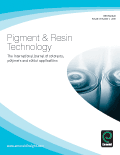
Pigment & Resin Technology
Transforming Ideas into Advanced Material SolutionsPigment & Resin Technology is an esteemed journal published by Emerald Group Publishing Ltd, focusing on the interdisciplinary fields of materials chemistry and coatings science. With a history spanning from 1972 to 2024, the journal serves as a vital platform for disseminating innovative research and developments concerning pigments, resins, and related materials technologies. Holding a respectable position in the Q3 category for both Materials Chemistry and Surfaces, Coatings, and Films as of 2023, it ranks within the 40th percentile among its peers, underscoring its relevance and impact within these domains. Although it does not currently offer open access, the journal remains a key resource for researchers, professionals, and students aiming to stay abreast of cutting-edge findings and practical applications in materials science. As such, Pigment & Resin Technology is essential reading for those engaged in the innovation and application of advanced materials in various industries.

INTERNATIONAL JOURNAL OF POLYMER ANALYSIS AND CHARACTERIZATION
Shaping the future of polymer research through rigorous inquiry.International Journal of Polymer Analysis and Characterization is a distinguished scholarly publication dedicated to the field of polymer science, with a focus on innovative methodologies and significant advances in the analysis and characterization of polymeric materials. Published by Taylor & Francis Ltd in the United Kingdom, this journal serves as a vital resource for researchers, professionals, and students deeply engaged in Analytical Chemistry, Chemical Engineering, and Polymer Science. With a convergence spanning from 1995 to 2024, it holds a Q3 ranking in the 2023 category quartiles for its valuable contributions to the fields of Analytical Chemistry, Chemical Engineering, and Polymers and Plastics. Despite being a non-open access publication, its rigorous peer-review process and comprehensive coverage of current trends ensure that the journal remains a crucial platform for disseminating impactful research. The journal is indexed in various databases, underscoring its relevance and quality in the academic community. Exploratory studies and articles that push the boundaries of polymer analysis find a welcoming home within these pages, making it an essential read for those aiming to stay at the forefront of polymer research.

REVIEWS ON ADVANCED MATERIALS SCIENCE
Advancing the Frontiers of Materials KnowledgeREVIEWS ON ADVANCED MATERIALS SCIENCE, published by De Gruyter Poland SP Z O O, is a preeminent open-access journal dedicated to disseminating cutting-edge research in the fields of condensed matter physics, materials science, and nanoscience. Since its inception in 2003, the journal has established itself as a crucial platform for scholars and practitioners to share innovative insights and advancements, achieving a commendable Q2 ranking in its respective categories for 2023. With its headquarters in the Russian Federation, the journal is not only committed to expanding the frontiers of scientific knowledge but also emphasizes inclusivity through its open-access model, which has been in effect since 2019, enabling universal access to its high-quality content. With an impactful standing illustrated by its Scopus rankings—136th in Condensed Matter Physics and 186th in General Materials Science—REVIEWS ON ADVANCED MATERIALS SCIENCE stands as a vital resource for researchers, professionals, and students eager to engage with contemporary discussions and discoveries in materials science.
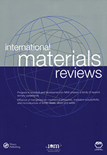
INTERNATIONAL MATERIALS REVIEWS
Your Gateway to Cutting-Edge Materials ReviewsINTERNATIONAL MATERIALS REVIEWS, published by SAGE Publications Inc, is a leading journal dedicated to the comprehensive analysis of contemporary research in the fields of materials chemistry, mechanical engineering, mechanics of materials, and the study of metals and alloys. With an impressive impact factor and a Q1 ranking across multiple categories such as Materials Chemistry and Mechanical Engineering in 2023, it ranks amongst the top journals for innovative materials research. The journal has a long-standing history since its inception in 1987 and continues to serve as a crucial resource for academics and professionals alike. Although it is not open access, it is renowned for its rigorous peer-review process and its commitment to disseminating high-quality materials science research globally. Researchers, students, and industry professionals benefit greatly from the journal's insightful reviews, both for the advancement of theoretical knowledge and practical applications within the fast-evolving materials field.

FIBRE CHEMISTRY
Unraveling the Complexities of Fibre Chemistry for a Sustainable Future.Fibre Chemistry is an esteemed journal published by Springer, focusing on the intricate and evolving field of polymer science and textile engineering. With its ISSN 0015-0541 and E-ISSN 1573-8493, this journal serves as a pivotal resource for researchers, practitioners, and students, highlighting significant advancements and innovations in fibre technology since its inception in 1969. Despite its current positioning in the Q3 quartile across Chemical Engineering, Chemistry, and Materials Science categories, Fibre Chemistry continually aims to bridge the gap between fundamental science and practical application by disseminating high-quality, peer-reviewed research articles. The journal does not currently operate under an open access model, but it provides crucial insights that foster collaboration and drive progress within its field. With the ongoing convergence of technologies and materials, this publication is poised to contribute significantly to the academic discourse surrounding fibre chemistry and its related disciplines until 2024 and beyond.

Research Journal of Textile and Apparel
Unveiling cutting-edge research for the textile industry.Research Journal of Textile and Apparel, published by Emerald Group Publishing Ltd, serves as a pivotal platform for advancing knowledge in the fields of textile and apparel research. With an ISSN of 1560-6074, this journal has been disseminating quality research since its inception in 1997, and it continues to contribute valuable insights through to 2024. The journal holds a Q3 ranking across multiple categories, including Business and International Management, Industrial and Manufacturing Engineering, Management of Technology and Innovation, and Materials Science, reflecting its commitment to high standards of scholarship. Although not an open-access journal, it provides a vital resource for researchers, professionals, and students eager to explore innovative textile technologies and sustainable practices within the fashion industry. As the textile sector navigates significant challenges and opportunities, this journal is uniquely positioned to foster collaboration and enhance understanding among diverse stakeholders.

Fibers
Elevating Knowledge in Structural Engineering and MaterialsFibers is a leading peer-reviewed open access journal published by MDPI, focusing on cutting-edge research within the realm of materials science, particularly in the domains of biomaterials, ceramics and composites, and structural engineering. Established in 2013, the journal has gained recognition for its significant contributions to the field, boasting an impact factor that positions it in the Q2 quartile across multiple categories such as Biomaterials, Ceramics and Composites, Civil and Structural Engineering, and Mechanics of Materials as of 2023. With a Scopus ranking that highlights its prominence—such as in the top 20% in Civil and Structural Engineering—the journal fosters an inclusive platform for academic dialogue and technical advancement. Researchers and professionals can access the journal’s comprehensive articles freely, promoting the dissemination of knowledge that is crucial for the advancement of innovative materials and their applications. Situated in Basel, Switzerland, Fibers continues to be an essential resource for those looking to stay at the forefront of research and technology in material sciences.
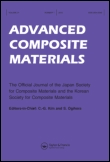
ADVANCED COMPOSITE MATERIALS
Shaping the Future of Mechanical Engineering with CompositesADVANCED COMPOSITE MATERIALS, published by Taylor & Francis Ltd, is a leading peer-reviewed journal in the field of materials science, specifically focusing on the innovative development and applications of composite materials. With an ISSN of 0924-3046 and E-ISSN 1568-5519, this journal serves as a vital resource for researchers and professionals worldwide, examining cutting-edge advancements and methodologies in composites, ceramics, and mechanical engineering. Having secured a solid standing in the academic community, it boasts impressive Scopus rankings, such as #185 in Mechanical Engineering with a 72nd percentile and #46 in Ceramics and Composites, emphasizing its relevance and rigor. Although not an open-access publication, its insights are invaluable for those looking to explore, contribute to, and stay abreast of the latest breakthroughs in the field from 1991 through 2024. By targeting critical areas within mechanics and material sciences, the journal continues to foster innovation and scholarly discussion, making it an essential venue for specialists striving to advance the capabilities and applications of composite materials.

INDIAN JOURNAL OF FIBRE & TEXTILE RESEARCH
Advancing textile innovation for a sustainable future.INDIAN JOURNAL OF FIBRE & TEXTILE RESEARCH (ISSN: 0971-0426, E-ISSN: 0975-1025) is a leading platform dedicated to advancing the field of textile research and innovation. Published by the NATIONAL INSTITUTE OF SCIENCE COMMUNICATION-NISCAIR in India, this open access journal has been fostering knowledge sharing since its establishment in 2006. With a broad scope encompassing Chemical Engineering, Environmental Science, and Materials Science, the journal's convergence from 1990 to 2024 highlights its commitment to ongoing academic dialogue. Currently categorized as Q3 in several disciplines, including Chemical Engineering and Environmental Science, it provides critical insights into contemporary challenges and developments. The journal's Scopus rankings further illustrate its influence within the research community, making it an essential resource for researchers, professionals, and students interested in textile technology and its intersections with sustainable practices. By fostering a collaborative environment for sharing pioneering research, the INDIAN JOURNAL OF FIBRE & TEXTILE RESEARCH stands as a vital conduit for scholarly communication in the textile sector.